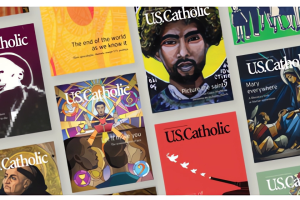c. 2014 St. Louis Post-Dispatch
FERGUSON, Mo. (RNS) Civil rights leader the Rev. Al Sharpton told a packed church on Sunday (Aug. 17) that the Michael Brown case would mark a defining moment in civil rights history and fundamentally change the way police engage with the African-American community.
“Michael Brown is going to change this town,” Sharpton said to a massive, boisterous crowd that clapped and shouted in response.
Hundreds filled the pews of Greater Grace Church. More crowded into the foyer, and hundreds remained on the parking lot unable to enter, all in a show of support for the African-American teenager who was shot by a police officer on Aug. 9.
Sharpton announced a future march in Washington on policing. He criticized the militarization of police, saying they act as if they are “at war with … citizens.” Sharpton urged the crowd to start showing up at the polls to vote and make a difference in the lives of African-Americans.
“Nobody can go to the White House unless they stop by our house,” Sharpton said. “We’ll be here until justice is achieved.”
In addition to Sharpton, Capt. Ronald S. Johnson of the Missouri Highway Patrol, who took over the police security patrol in Ferguson last week, was on hand to offer support to Brown’s family, as was U.S. Rep. William Lacy Clay, D-St. Louis.
“I want you to know these parents are not going to cry alone, they’re not going to stand alone,” Sharpton said, referring to Brown’s parents, who were also at the church. “We’ve had enough.”
Benjamin Crump, the Brown family’s lawyer, also took the stage.
“We’re here to talk about justice,” said Crump. “We’re here to stand up for our children, because if we don’t stand up for our children, nobody will stand up for our children. They just want what anyone else would want if their child was shot in broad daylight,” he said.
When Johnson of the Highway Patrol spoke he compared Brown to his own son.
“When this is over I’m going to go into my son’s room, my black son, who wears his pants sagging, wears his hat cocked to the side, got tattoos on his arms. But that’s my baby,” Johnson said. “Michael is going to make it better for our sons, so they can be better men.”
Crump told supporters not to lose focus amid news that Brown is alleged to have robbed a convenience store just before the shooting. He called the allegations an attempt to assassinate Brown’s character.
Sharpton first took the stage with the Brown family receiving a standing ovation. Brown’s mother, Lesley McSpadden, overwhelmed by the response, bowed her head, breaking down in tears.
As at previous forums, Sharpton urged demonstrators protesting Brown’s death to do so in a peaceful manner.
He also said Ferguson residents would take to the streets with bright yellow T-shirts, calling themselves “Disciples of Justice,” or DJs, to help contain any violence on the streets.
Sharpton announced a class-action lawsuit for demonstrators who had been victims of tear gas and other injuries at the hands of police, though he gave few specifics.
People turned out with families, babies in strollers and children on shoulders.
Laronda Hodges, 46, a counselor for St. Louis Public Schools, was outside the church with her husband and 13-year-old daughter. “I just want to be a part of making a difference,” Hodges said. Nothing seems to change, she added, pointing to discrepancies in pay, in positions, in elected offices.
One pocket of people huddled around a radio station van broadcasting what was being said inside the church.
But not everyone was happy with Sharpton’s speech.
“He always wants to hush us without handling the whole situation,” said Zsazzi Powell, 27, a stay-at-home mother in Ferguson. “We’re tired of all the pacifying.”
Alicia Berry, 38, a teacher, said Sharpton should pressure the media to not always emphasize the negative. She said the media had paid too much attention to the looting that happened last week, rather than shining a light on those who had worked hard to keep the rallies safe.
“Every race has its handful of fools,” she said.
Berry called Sharpton’s speech “powerful” but said she wanted to know — “What’s going to happen after this?”
(Lilly Fowler is the religion reporter for the St. Louis Post-Dispatch. Reach her on Twitter.)












